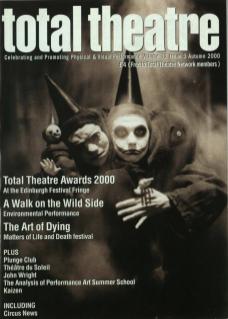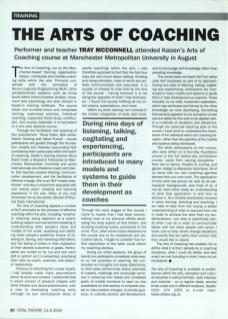The Arts of Coaching, run by the Manchester-based training organisation Kaizen, introduces and clarifies coaching skills within the arts. Primarily concerned with the principles of Neuro-Linguistic Programming (NLP), other complementary systems such as those found within communication studies, movement and psychology are also utilised in Kaizen's training methods. The course totals one hundred hours and comprises training, supervised practice, individual coaching, supported home study, certification, and course materials. It is equivalent to a one-year diploma course.
Through the facilitation and teaching of four practitioners – Rivca Rubin, Bob Jones, Niamh Dowling and Steve Purcell – course participants are guided through the foundation models and theories surrounding NLP, considering them particularly within the realm of coaching. Kaizen's training director Rivca Rubin holds a Research Fellowship at Manchester Metropolitan University and works internationally as a freelance coach and trainer. She teaches creative thinking, communication development, and the facilitation of effective change. She is an NLP master practitioner and also a movement specialist with over twenty years' creating and teaching experience in the arts. Many of you may remember her as the artistic director of Physical State International.
The Arts of Coaching applies a number of NLP principles to the process of effective coaching within the arts, including: ‘emphatic' listening; being objective as a coach; building rapport and sometimes breaking it; understanding other people's views and models of the world; analysing and clarifying other people's preferred choice of listening to, storing, and retrieving information; and the aiding of others in their realisation of their desired outcomes or goals. Participants are invited to try out and test each skill or system as it is presented, practising their roles as coach, coachee, and observer respectively.
Previous to attending the course myself I had already made many assumptions about its aims and content. I presumed that it would consist of physical classes with other theatre and dance practitioners, with a view to developing coaching skills (through my own stereotypical ideas of sports coaching) within the arts. I was therefore surprised to find that the first four days are very much about talking, thinking and trying exercises, most of which are verbally communicated and executed. It is equally of interest to note that by the end of the course – having believed it to be doing the opposite of what I had anticipated – I found the course fulfilling all my initial criteria, expectations, and more.
Within my actor training I am involved in the holistic integration of body and mind. Through the early stages of the course I came to realise that I had been concentrating most of my previous efforts developing the body aspect of that holism, and avoiding anything overtly connected to the mind. Thus, after some initial resistance to the course due to its intellectual and discursive nature, I began to consider how further exploration of the latter could inform my coaching abilities.
During our initial sessions, the group of twenty-two participants considered what were, to us, the purposes of coaching. We constructed our thoughts into these statements: to elicit peak performance and/or potential; to support, challenge and encourage someone in achieving their stated and unrealised goals; to enable someone to open up new possibilities for themselves; to empower people to make positive changes; to provide guidance; to cultivate positive self-development; and to encourage self-knowledge rather than providing knowledge.
The course does not teach NLP but rather uses NLP processes as part of its approach. During nine days of listening, talking, cogitating and experiencing, participants are introduced to many models and systems to guide them in their development as coaches. These included, to my relief, movement exploration, which was reinforced and framed by the other knowledge we were developing. Something that became apparent to me during the course was the ability for this work to be applied within a multitude of situations and disciplines. Through the particular teaching style of this course, I have come to understand the importance of the individual within the coaching situation, rather than the specifics of the models and systems being introduced.
The other participants on the course, who were either on a four-day foundation course or the full twelve-day certification course, came from varying disciplines – from law to dance, theatre to surfing, and garden design to Alexander technique. All of us came with our own coaching agendas derived from our own work. The application of this work has proven as vast as its participants' backgrounds, and most of us, if not all, have taken away an understanding of what that application is and how to achieve it. As a theatre practitioner involved in actor training, directing and teaching, I am able to take from the course a better understanding of what is required from me in order to achieve the best from my students/actors. I am able to specifically clarify what I can do in order to communicate better with the other people with whom I work, and to help others change situations and events that are within their control, that they would like to adjust.
The Arts of Coaching has enabled me to define what it is that I already do in coaching situations, what I could do better, and also what I am not including or what I have not yet considered.
The Arts of Coaching is available to professionals within the arts, education and cultural industries in various formats – both intensive and modular – on a regular basis, several times a year and in different locations.

